Edie Melson's Blog, page 122
June 24, 2022
Two Simple Techniques to Undermine the Readers’ Expectations and Keep Them Emotionally Hooked

by Zena Dell Lowe @ZenaDellLowe
The essence of story is that the plot unfolds because of the choices a character makes under pressure to achieve a particular goal. Without a primary objective, there is no story, because everything that happens in that story must be connected to the main character’s goal and his relentless pursuit of it. And as the story unfolds, your character will inevitably start to piece things together. They’ll start to see a way for them to actually accomplish their goal. A plan will form in their minds; they’ll know exactly what they need to do to make it all come together.
And this is when you need to pull the rug out from under them… if you want to keep your audience interested and emotionally invested in their journey, anyway. Consider these three principles.There’s nothing more boring in story than predictability.We’re delighted by surprise.We’re most satisfied when our expectations are met in an unexpected way.
The question is: how do we deliver an unpredictable, delightful ending to a story that surprises the audience but also satisfies their expectations in a way they couldn’t have seen coming?
You start by messing with your character and generally making their lives miserable, and this can be achieved in two simple, relatable way.
1. Give him a plan.
Remember, as the person driving the action of your story, your main character should be aware of the danger he faces, which means he ought to take adequate steps to mitigate that danger. This means acquiring weapons, knowledge, allies, skills, information, or any other resources that might possibly give him an advantage. But above all else, it means formulating a plan. Your character’s best chance at achieving his goal or defeating the bad guy or becoming the hero he was always meant to be hinges on this one step. He must be able to come up with a reasonable and intelligent plan.
Your character must plan. He must strategize. He must try to anticipate the threats he will face, and somehow determine a way to overcome those challenges. Sometimes, of course, things happen quickly, which leaves the character with little time to strategize. Nevertheless, he must utilize any available time he’s given to organize a plan of attack.
This is especially true if the character has ample time to plan ahead. If he has time, he must take it. Otherwise, we will think him a fool. I mean, this is straight up out of the Bible, folks: “A wise man sees danger ahead and avoids it, but a fool keeps on going and suffers for it.” Any character who wings it when they could have planned ahead deserves nothing but scorn. We simply cannot respect a character who improvises when they could have gone in prepared. We will see his ill-preparation as idiocy, and we will hate him for it (which you probably want to avoid).
Instead, have your character take advantage of whatever time he has by concocting a solid, well-thought-out strategy in advance. He concocts the best possible plan that he can, making provision for every possible contingency. He tries to predict any possible problem, and then he goes into battle, confident that he's thought of every conceivable scenario in advance. And that’s when things go to hell.
2. Blow up the plan.
In the poem “To a Mouse” by Robert Burns, he states, “The best laid schemes of mice and men often go askew.” In other words, even the most carefully made plans sometimes go wrong. In the case of your story, though your main character needs to have done his due diligence, nothing goes according to plan. Everything falls apart. The whole thing is haywire. And once again, your character is forced to improvise, to use his wits, to rely on nothing but himself. But this time we will respect it because he did everything in his power to prepare for this battle in advance. But things still go to hell, and now he must think fast under pressure and make hard choices, which reveal his true character.
And by the way, whatever goes wrong at this stage can't be your character’s fault. Maybe he feels responsible, maybe he feels like he should have seen it coming, but at the end of the day, it should be beyond the limits of his power. There should be no way for him to have predicted whatever it was that happened to blow it all up. Let him blame himself, but ultimately, it must be due to factors that were far beyond his control. It simply cannot be his fault, or the result of a bad plan, because that would make it his fault, which would make him an idiot.
CONCLUSION
The point of all of this, of course, is that when you give your character a well-thought-out plan and then you blow it up in ways he never saw coming, well, guess what? If you do it right, your audience won’t see it coming, either. In other words, when you blind side your character, you have a better chance of surprising your audience. And since you, as the writer, will have to write your character out of that impossible situation, even YOU won’t be able to predict how it will all work out. You’ll get to discover the solutions right alongside your character. This is scary. I won’t deny it. It’s terrifying as a writer to give up that kind of control. But if you do, I promise you, that’s when the magic happens. Whatever your predictable, banal, trite solution was going to be, now you’ll tap into the magic you never saw coming, and you’ll end up being just as delighted and surprised as your readers.
TWEETABLETwo Simple Techniques to Undermine the Readers’ Expectations and Keep Them Emotionally Hooked, insight from @ZenaDellLowe on @EdieMelson (Click to Tweet)
 Zena has worked professionally in the entertainment industry for over 20 years as a writer, producer, director, actress, and story consultant. Zena also teaches advanced classes on writing all over the country. As a writer, Zena has won numerous awards for her work. She also has several feature film projects in development through her independent production company, Mission Ranch Films. In addition to her work as a filmmaker, Zena launched The Storyteller’s Mission with Zena Dell Lowe, a podcast designed to serve the whole artist, not just focus on craft. In 2021, Zena launched The Storyteller’s Mission Online Platform, where she offers advanced classes and other key services to writers. Zena loves story and loves to support storytellers. Her passion is to equip artists of all levels to achieve excellence at their craft, so that they will truly have everything they need to change the world for the better through story.
Zena has worked professionally in the entertainment industry for over 20 years as a writer, producer, director, actress, and story consultant. Zena also teaches advanced classes on writing all over the country. As a writer, Zena has won numerous awards for her work. She also has several feature film projects in development through her independent production company, Mission Ranch Films. In addition to her work as a filmmaker, Zena launched The Storyteller’s Mission with Zena Dell Lowe, a podcast designed to serve the whole artist, not just focus on craft. In 2021, Zena launched The Storyteller’s Mission Online Platform, where she offers advanced classes and other key services to writers. Zena loves story and loves to support storytellers. Her passion is to equip artists of all levels to achieve excellence at their craft, so that they will truly have everything they need to change the world for the better through story.To find out more about Zena or her current courses and projects, check out her websites at WWW.MISSIONRANCHFILMS.COM and WWW.THESTORYTELLERSMISSION.COM
Featured Image: Photo by Willian Justen de Vasconcellos on Unsplash
Published on June 24, 2022 22:00
June 23, 2022
Online Presentations & 5 Things NOT to Do

by Lori Hatcher @LoriHatcher2
Let’s face it. Zoom is here to stay. The pandemic pushed most of us into online and virtual communication, and, for the most part, this is a good thing. The ability to Zoom affords opportunities to share our message that we’ve never had before.
As written communicators, we seek to present our best selves by producing work that’s polished, professional, and free of errors. We should do the same when communicating through Zoom and other video-based media.
5 Mistakes to Avoid as We Interact with Each Other over Phones & Computers
Mistake #1: Poor Camera Position
For attractive and professional broadcasts, position the camera on your phone or computer at eye level. Too low and you get the dreaded double chin view. Too high and you look like a matchbox car at the bottom of the Grand Canyon. Eye-level positioning reduces shadows and ceiling views and can even make you look thinner. Want to look five pounds skinnier? Position your camera properly.
Mistake #2: Improper Lighting
Poor lighting is the second-most common mistake Zoomers make. Before you click Start, use your phone camera to check the light level. Set it to video and hold it up in front of you. Can you see your face clearly? Is there a light source behind you that puts your face in a shadow? Does sunlight through a window shadow half your face? Does light coming through blinds make you look like a convict in a jail cell?
Position yourself so the light source is in front of you and behind the camera/computer. Turn on room lights or a ring light for the proper balance.
Mistake #3: A Bad Background
Bad backgrounds can be distracting. I don’t know how many times I’ve lost track of what the speaker was saying because I kept looking at the crooked picture on the wall behind them. Or the pile of laundry on the bed. Or the cat lolling across the back of their couch.
Find a spot with a pleasant wall space and set up there. I often use my (neat and organized) wall-to-ceiling bookshelf in my study as a backdrop. Or the sideboard in my dining room that holds my blooming orchids. If you don’t have a spot like this, buy a fake background (Very inexpensive. See the link below to one of my favorites) and use this for broadcasts.
Mistake #4: Failure to Mute
Please, please, please mute your broadcast when you’re not speaking. If you don’t, you risk disturbing everyone on the meeting when your next-door neighbor decides to mow his lawn, your child rushes in screaming, or your visiting granddog barfs at your feet (this really happened). You don’t want to be that person.
Mistake #5: Lack of Simple Equipment
I began this post with the words, Let’s face it. Zoom isn’t going away. Because this is true, it makes sense to invest in some simple equipment to make your Zoom interactions professional and positive.
Here are three items I recommend:A Selfie Ring Light Kit. Choose a kit that includes a tripod for your phone, a light with several settings, and a remote on/off clicker.A tabletop phone holder. Less complicated than a tripod, this simple tool allows you to Zoom on your phone or iPad without having to hold your device the whole time.A background. Amazon has every kind of background imaginable. You can choose a woodland scene, a library, an office setting, or a neutral color. If most of your Zoom meetings are for professional purposes, choose a background that reflects this. If casual or whimsical, let this direct your choice. I’m grateful for Zoom and other online methods to connect. The ability to communicate long distance brings with it incredible opportunities. With a little forethought and a few simple tools, we can present ourselves and our message with poise and professionalism.
Now it’s your turn. In the comments below, share your favorite tip for delivering an exemplary Zoom presentation.
TWEETABLEOnline Presentations & 5 Things NOT to Do, tips from @LoriHatcher2 on @EdieMelson (Click to Tweet)
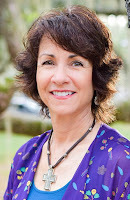 Lori Hatcher is an author, blogger, writing instructor, women’s ministry speaker, and career dental hygienist. She writes for Our Daily Bread, Guideposts, Revive Our Hearts, and Crosswalk.com. Lori’s latest devotional, Refresh Your Prayers, Uncommon Devotions to Restore Power and Praise, released March 1 with Our Daily Bread Publishing. Connect with her at www.LoriHatcher.com or on Facebook, Twitter(@lorihatcher2) or Pinterest (Hungry for God).
Lori Hatcher is an author, blogger, writing instructor, women’s ministry speaker, and career dental hygienist. She writes for Our Daily Bread, Guideposts, Revive Our Hearts, and Crosswalk.com. Lori’s latest devotional, Refresh Your Prayers, Uncommon Devotions to Restore Power and Praise, released March 1 with Our Daily Bread Publishing. Connect with her at www.LoriHatcher.com or on Facebook, Twitter(@lorihatcher2) or Pinterest (Hungry for God).Featured Image: Photo by Chris Montgomery on Unsplash
Published on June 23, 2022 22:00
June 22, 2022
Proverbs For Writers

by Henry McLaughlin @RiverBendSagas
There is so much wisdom and wise counsel in the book of Proverbs. Like many believers, I spend time in this book every day. Sometimes a single verse or a few verses grab my attention. Other times, I’ll read an entire chapter. Often, what I read will speak to a specific area in my life. The following are some verses I believe apply to all of us, but especially those of us who are pursuing the dream of being writers.
Proverbs 3:12 (NLT) For the Lord corrects those he loves, just as a father corrects a child in whom he delights.
We are writing for the Lord in response to the call he has placed on us. Some of us do it enthusiastically. Some of us not so much. Perhaps we’ve become discouraged by the struggles of getting published.
Remember, the Lord loves us, and he delights in us when we do our best to answer his call. And he corrects us. Maybe writing is frustrating because we’re trying to write in an area God hasn’t called us to write in. Perhaps we’re focusing on devotionals or inspirational books when he wants us to write fiction. Wherever the Father calls us to write, he has a plan to use our words to inspire and guide our readers into closer relationships with him. Whether it’s fiction or nonfiction, but if we’re not in the area, he wants us to be, writing will feel like trying to go forward with one shoe nailed to the floor. We’ll only go in circles.
Maybe we believe we can’t write in the area he wants us to write in. Then we trust in his correction and his guidance. He won’t call us to do something without equipping us to do it. It might be hard. You can almost count on it being hard. But he is doing it for our good and to build his kingdom. As Paul wrote, we are all part of the body of Christ, and we each have our unique place. If we step out of that place, he will correct us because he loves us, and he delights in us. After all, each of us is his favorite child.
Proverbs 12:1 (NLT) To learn, you must love discipline; it is stupid to hate correction.
It’s rare for the Bible to use the word “stupid.” Some translations use the word “foolish.” Is there that much of a difference?
Hebrews 12:11 (NLT) takes us a little deeper into this concept: “No discipline is enjoyable while it is happening—it’s painful! But afterward, there will be a peaceful harvest of right living for those who are trained in this way.”
Receiving and implementing discipline is hard. Often, we have to give up behaviors and attitudes that are very dear to us. But they aren’t working. At least in our writing. So, we need to learn new disciplines to become the writers God has called us to be.
Proverbs for WritersI’ll leave you with these final thoughts in the form of proverbs:He who learns the craft through correction and discipline shall produce stories worth reading.A writer seeks counsel (discipline and correction) and feedback, for in these are strength and wisdom.A writer who walks in humility is wise and will grow in skill, talent, and ministry.
Be blessed as you continue your writing adventures in God.
What proverbs—either Biblical or from another source or written by yourself—help you be the best writer you can?
TWEETABLEProverbs for Writers, insight & encouragement from author Henry McLaughlin, @RiverBendSagas on @EdieMelson (Click to Tweet)
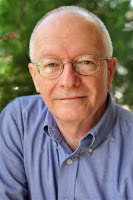 Henry’s debut novel, Journey to Riverbend, won the 2009 Operation First Novel contest.
Henry’s debut novel, Journey to Riverbend, won the 2009 Operation First Novel contest.Henry edits novels, leads critique groups, and teaches at conferences and workshops. He enjoys mentoring and coaching individual writers.
Connect with Henry on his BLOG, TWITTER and FACEBOOK.
Featured Image: Photo by Aaron Burden on Unsplash
Published on June 22, 2022 22:00
June 21, 2022
21 Ways for Writers to Reduce Stress

by DiAnn Mills @DiAnnMills
Writers are often stalked by a predator called stress. It’s a nasty disorder that can cause headaches, back and body pain, nausea, depression, problems in relationships, and a host of other physical and mental ailments. Not a pleasant malady.
The causes of stress are as many as how it manifests in our bodies. We get ourselves into an overwhelmed mode with edits, harsh critiques, rejections, writer’s block, looming deadlines, and self-imposed perfection. Who wants to deal with misery if there’s a solution?
These tips to reduce stress may also improve your physical and mental disposition.
Writers Can Reduce Stress with These 21 Tips
1. Remember why writing first excited you. Post it near your computer.
2. Accept you’re not perfect.
3. Determine rejections are redirections. Turndowns are of the manuscript, not the writer.
4. Get outside and enjoy nature.
5. Take a walk.
6. Eat a healthy diet. We are what we eat.
7. Journal the emotions that coincide with your stress.
8. Understand stress is a normal reaction, and it does help us accomplish great things.
9. Take a nap. Sleep deprivation solves nothing.
10. Learn how to say no. This means in your professional and personal life.
11. Schedule relaxation times. Read or enjoy a hobby.
12. Delegate tasks. Writer, no one expects us to be workhorses.
13. Consider a social media break.
14. Breathe in and out to calm yourself.
15. Determine when you write best: morning, afternoon, or evening.
16. List your priority of projects.
17. Pray. God gave you the gift of writing, and He will help you through the downtimes.
18. Practice laughing, a huge belly laugh.
19. Plan a getaway or retreat.
20. Try writing in a different spot.
21. Listen to soothing music.
We are fortunate to have the finest career on the planet. We create worlds out of words, love from a single smile, happiness from a touch, and friendships from unlikely people. A strong writer refuses to allow stress to destroy the art of communicating through the written world
What tip can you offer to avoid stress?
TWEETABLE21 Ways for Writers to Reduce Stress, tips from @DiAnnMills on @EdieMelson (Click to Tweet)
 DiAnn Mills is a bestselling author who believes her readers should expect an adventure. She creates action-packed, suspense-filled novels to thrill readers. Her titles have appeared on the CBA and ECPA bestseller lists; won two Christy Awards; and been finalists for the RITA, Daphne Du Maurier, Inspirational Readers’ Choice, and Carol award contests.
DiAnn Mills is a bestselling author who believes her readers should expect an adventure. She creates action-packed, suspense-filled novels to thrill readers. Her titles have appeared on the CBA and ECPA bestseller lists; won two Christy Awards; and been finalists for the RITA, Daphne Du Maurier, Inspirational Readers’ Choice, and Carol award contests. She is the former director of the Blue Ridge Mountain Christian Writers Conference, Mountainside Marketing Retreat, and Mountainside Novelist Retreat with social media specialist Edie Melson. Connect here: DiAnnMills.com
Featured Image: Photo by Jason Leung on Unsplash
Published on June 21, 2022 22:00
June 20, 2022
4 Reasons to Become a Contributing Author

by Lucinda Secrest McDowell @LucindaSMcDowel
How many of us published authors began our publishing career by contributing to anthologies organized by others?
I see those hands. And mine is raised as well.
This month I had the privilege of curating an anthology of devotions which encourage writers and speakers. My co-director of “reNEW – spiritual retreat for writers & speakers” Rachel Britton, and I invited 60 alumni from our community to each be a contributing author to “The Courage to Write” which is now available on Amazon.
Everyone had a different story. Everyone wrote from a different level of expertise. And all contributions are, if I may say so myself, remarkable.
Today I would like to encourage you to consider being part of such an endeavor.
4 Benefits of Being a Contributing Author
1. PURPOSE
Our first responsibility in both writing and speaking is to seek God’s clear calling, vision, and gifting in our lives. As you pursue writing, may I encourage you to intentionally fill up spiritually so that you have quality teaching to pour out through your words. With such discipline will come many stories as you begin to recognize the intersection of God’s Truth with everyday life. This is what you will write and one of those stories could be tailored for an anthology. You might hear about it from a conference contest, a connection with an author you met, or even a call-out for submissions you read online. Yes, be diligent to research all the details, but consider this as a potential opportunity to fulfill your purpose.
2. PEOPLE
Perhaps the best part of being a contributing author is the company you keep. Not only your chance to work with compilers of the project, but all your fellow contributors have a bond of a common pursuit – the book and how it will minister to others. Some anthologies have even established their own private Facebook groups for support or held in-person gatherings like our annual “reNEW – spiritual retreat for writers & speakers” which brings together people of a common interest to grow and network and seek God’s guidance for further endeavors. Where do you find such an opportunity?
Talk to people at that writer/speaker event this summer. Keep your eyes out as you listen to podcasts or read news in the Christian publishing industry. Faculty and writing coaches also can be a great resource. When I offer one-hour consulting sessions on writing/speaking/spiritual growth, I often direct my clients to key people who are putting together compilation projects.
3. PUBLISHING CREDIT
Perhaps one of our biggest thrills at curating “The Courage to Write” was the opportunity to continue to mentor emerging writers in their first publishing endeavor. All of us love to see our words actually in print in a book! And being a contributing author is a credit you can list in your bio and credentials as you continue to pursue further writing and speaking.
4. PRODUCT
Finally, not the most important perk but not the least either, you now have another product to offer your tribe either online or when you speak. That book you contributed to makes an excellent gift to new contacts in the publishing world, and also for blog giveaways and online incentives. Most compilation projects offer you a contributing author discount which probably won’t make you rich, but will help launch you as a paid author.
In conclusion, friend, may I just encourage you to keep writing. Keep speaking. Keep discovering and putting together all those words that God gives you. Share them in a wide variety of ways, even sometimes when there is no money involved. For God promises that His Word (upon which we base all our words) will never return void. Nothing is wasted when offered back to Him.
And, if you don’t mind my ending with a “proud mama” plug: I think you would really enjoy our book The Courage to Write offered HERE.
TWEETABLE4 Reasons to Become a Contributing Author, insight from @LucindaSMcDowel on @EdieMelson (Click to Tweet)
 Lucinda Secrest McDowell, M.T.S., is a storyteller and seasoned mentor who engages both heart and mind while “Helping You Choose a Life of Serenity & Strength.” A graduate of Gordon-Conwell Theological Seminary and Furman University, McDowell is the author of 17 books and contributing author to 36+ books. Her award-winning books include Soul Strong, Life-Giving Choices, Dwelling Places, and The Courage to Write. Lucinda, a member of the Redbud Writers Guild and AWSA, received Mt. Hermon “Writer of the Year” award and guest blogs monthly for ‘The Write Conversation.’
Lucinda Secrest McDowell, M.T.S., is a storyteller and seasoned mentor who engages both heart and mind while “Helping You Choose a Life of Serenity & Strength.” A graduate of Gordon-Conwell Theological Seminary and Furman University, McDowell is the author of 17 books and contributing author to 36+ books. Her award-winning books include Soul Strong, Life-Giving Choices, Dwelling Places, and The Courage to Write. Lucinda, a member of the Redbud Writers Guild and AWSA, received Mt. Hermon “Writer of the Year” award and guest blogs monthly for ‘The Write Conversation.’ Whether pouring into young mamas, leading a restorative day of prayer, or coaching writers and speakers through “Encouraging Words Consulting,” she is energized by investing in people of all ages. As a communications teacher, she co-directs “reNEW – spiritual retreat for writers & speakers” and has served on the faculty of Speak Up Conference, Mount Hermon Christian Writers Conference, Blue Ridge Mountains Christian Writers Conference, Florida Christian Writers Conference, Asheville Christian Writers Conference, and She Writes for Him. Known for her ability to convey deep truth in practical and winsome ways, McDowell shares words from “Sunnyside” cottage in New England and blogs weekly at WWW.LUCINDASECRESTMCDOWELL.COM
Published on June 20, 2022 22:00
June 19, 2022
Increase Marketing by Building Publishing Relationships

by Karen Whiting @KarenHWhiting
Getting to know people in the publishing industry widens your horizons and broadens your marketing reach. Build awareness of the roles and people in the industry and how to network in ways that are mutually beneficial.
Editors and acquisition editors Editors are key decision makers in magazines and books. They also work to keep up with trends and what’s selling within their publishing houses. It’s beneficial to build relationships with editors and realize they often move around. I had a book editor call me when he switched to a new publishing house, and we chatted to come up with something I could write for him.
Editors observe authors rise up and succeed while others floundere They have good advice that comes from experience. You may be able to connect an editor with someone who can fill a need This is particularly true with magazine editors. Network over the love of books to see what they like and hope to publish in the future. Editors looking for authors in specific appreciate help in making the right connections. One of my first contracts came from a writer who introduced me to an editor looking for an author to write a book for families.
AgentsLiterary agents represent authors in the quest to get published. They will get behind authors and books they believe in. They don’t get paid until a book is contracted, so they are motivated to make deals. Agents will guide the author in polishing their proposal and book to be sure it is ready to submit. They look at many manuscripts and can scan and quickly decide what’s ready and what needs work. Ask their opinion of your work and advice on steps to take to move forward in writing. Ask them what they’ve seen authors do in marketing that worked. If they are looking for a specific genre, connect them with writers who can deliver great writing in that area. One of my agent friends asks me for thoughts on where to submit books that she hasn’t placed and also passes on trends in the market she’s noticed
Digital Content ManagersThese savvy people find writers to provide content for websites, especially high traffic sites. It’s good to be in touch to see if they need articles or posts on topics related to your books. One friend moved to a new website and had introduced me to his assistant who filled his vacancy. I contacted each separately and pitched different ideas. They both asked for me to submit the articles I pitched.
Content managers understand what topics become hot and what gets the most hits. They also notice what lengths work and what styles of articles hit home with their readers It’s great to exchange ideas of what you can write with what they see thatreaders need. That helps you better approach you audience..
PublicistsPR people who help authors get booked for interviews may also coach those authors in how to present themselves and help shape their press releases and press kits. A good publicist can help you spread the word about your books. Traditional publishers may have an in-house publicist. If so, be sure to schedule a call to discuss your passion and ideas of how to reach your audience. They understand how to present you as a guest and remain connected with media that grabs the attention of their readers.
Conference Directors and Conference FacultyConference directors talk to people all year long. They book a variety of guest speakers. They can help you connect to influencers, editors who accept submissions in your genre, and even authors from your area. They have such a heart for writers and encourage writers who feel discouraged. You can also connect directors to people in your network from promoting the event to bring in more attendees to introducing them to editors and high-profile authors you know. I’ve helped connect a number of conference directors to new people they added to their faculty.
Broaden your perspective with more than great writer conference. If you have an idea for a film or documentary look at events in that industry such as the International Christian Visual Media (ICVM) or film festivals. Consider conferences that focus on marketing, your specific genre, or speaking. These directors and their programs open new doors to increase your network and marketing abilities.
Service ProvidersThis group includes freelance editors, coaches, consultants, and companies that provide services from book covers, content writing, training, to full indie publishing. These are generally for various fees depending on the expertise and scope of the need. It’s good to find out the prices and compare the service providers. Investigate to be sure it’s not a scam. The more pressure used, the more likely it is a scam, or a place that overcharges..
Service oriented professionals understand what’s happening in the publishing world. Listen to them and ask questions about their topic of expertise. They can often help you identify your specific needs and where to find the help. They may also be able to connect you with other people in the industry. Watch them and how they market their business as examples of what works that you can apply to your marketing plans.
Be open to growing your network in ways that benefit everyone and realize there are many people who are part of the publishing industry.
TWEETABLEIncrease Marketing by Building Publishing Relationships, tips from @KarenHWhiting on @EdieMelson (Click to Tweet)
 Karen Whiting (WWW.KARENWHITING.COM) is an international speaker, former television host of Puppets on Parade, certified writing and marketing coach, and award-winning author of twenty-seven books for women, children, and families. Her newest book, The Gift of Bread: Recipes for the Heart and the Table reflects her passion for bread and growing up helping at her grandparent’s restaurant. Check out her newest book Growing a Mother’s Heart: Devotions of Faith, Hope, and Love from Mothers Past, Present, and Future. It's full of heartwarming and teary-eyed stories of moms.
Karen Whiting (WWW.KARENWHITING.COM) is an international speaker, former television host of Puppets on Parade, certified writing and marketing coach, and award-winning author of twenty-seven books for women, children, and families. Her newest book, The Gift of Bread: Recipes for the Heart and the Table reflects her passion for bread and growing up helping at her grandparent’s restaurant. Check out her newest book Growing a Mother’s Heart: Devotions of Faith, Hope, and Love from Mothers Past, Present, and Future. It's full of heartwarming and teary-eyed stories of moms.Karen has a heart to grow tomorrow’s wholesome families today. She has written more than eight hundred articles for more than sixty publications and loves to let creativity splash over the pages of what she writes. She writes for Crosswalk. Connect with Karen on Twitter @KarenHWhiting Pinterest KarenWhiting FB KarenHWhiting.
Published on June 19, 2022 22:00
June 18, 2022
How Do You View Your Writing Life?

by Tammy Karasek @TickledPinkTam
Most of us have heard the cliché about the issue of your glass being half full or half empty. Writing can have that same issue, or your attempt at writing that is.
I think of the phrase—half empty—as something on the negative side. If your writing glass is half empty, you may be struggling with low confidence, avoiding the keyboard, or discouraged in your comparison of yourself in your journey to where other writers are.
With the opposite phrase—half full—this could be a total one-eighty from the half empty. Maybe you’re quite full of yourself in your success. You’re riding high on the waves of the accolades and atta boy/girl. You’re quite proud of yourself and all that you’ve done, forgetting who gave the ability to you in the first place.
I tend to answer the question when asked if I’m a half-full or half-empty person with … I’m neither.
My writing glass is neither half full nor half empty. It’s completely empty. While other folks are arguing which is best, I have finished the liquid in the glass and jumped back into the job at hand—my writing. I’m confident, but not too much. I’m making progress in that word count, and I take time to remember who gifted me with both the words and the talent to work them into a relatable piece.
I use His strength and power to build my confidence and charge on. Not in a bull in a china shop way of powering over people along the way to gain my success. More like a riding the wave of confidence. God called me to write so I power through. He gave me stories in my head that won’t stop. I charge to my keyboard to capture them and get them written down. I’m tenacious as I stare down those deadlines, those contest submissions, etc. I will not allow them to fill my cup with doubt, discouragement, pride or boastfulness.
It doesn’t matter whether you choose to see your writing life as half full or half empty or totally empty. My suggestion is that you contemplate the thought of seeing that glass empty because drank it all and you’ve hydrated yourself to charge after you’re calling. Continue to drink from the glass of learning to be better in your writing. One final thought—make sure you’re showing up and walking large and in charge of your writing career.
What about you? Is your writing glass empty today because you’ve balanced the positive with the negative to have a strong writing plan?
TWEETABLEHow Do You View Your Writing Life? Insight & Encouragement from @TickledPinkTam on @EdieMelson (Click to Tweet)
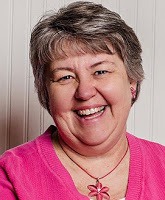 Tammy Karasek uses humor and wit to bring joy and hope to every aspect in life. Her past, filled with bullying and criticism from family, drives her passion to encourage and inspire others and give them The Reason to smile. She’s gone from down and defeated to living a “Tickled Pink” life as she believes there’s always a giggle wanting to come out!
Tammy Karasek uses humor and wit to bring joy and hope to every aspect in life. Her past, filled with bullying and criticism from family, drives her passion to encourage and inspire others and give them The Reason to smile. She’s gone from down and defeated to living a “Tickled Pink” life as she believes there’s always a giggle wanting to come out! She’s the Social Media Manager for the Blue Ridge Mountains Christian Writers Conference, Founding President and current Vice-President of ACFW Upstate SC, Founding President of Word Weavers Upstate SC. She’s a writing team member for The Write Conversation Blog, Novel Academy, and MBT Monday Devotions and others. Her work was published in a Divine Moments Compilation Book—Cool-inary Moments. When not writing Women’s Fiction and Rom-Com, she’s The Launch Team Geek helping authors launch their books and a Virtual Assistant for authors.
Published on June 18, 2022 22:00
June 17, 2022
Why You and Your Writing Matter

by Emme Gannon @GannonEmme
One hundred years from now we will all be forgotten. No one will remember that we existed. All our thoughts and deeds will be a thing of the distant past, remembered no more.
So were the words of my son James during a particularly introspective moment. His comment caught me off guard and I responded by muttering something that did little to address his concerns.
His contemplation on our human existence gave me pause. Most of us lead simple lives, taking care of our families and, as writers, doing our best to produce words that have life and bring encouragement and entertainment to our readers. Few of us will go down in history and be remembered generations from now. In the grand scheme of things, we may wonder if all our efforts make a difference.
My son’s lament was also shared by Solomon in Ecclesiastes 1:2. “Vanity of vanities, says the Preacher, vanity of vanities; all is vanity.” Vanity means vapor or breath, emptiness, transitory. He’s saying we are but breath, vapor, and all is transitory. Here today, gone tomorrow.
Solomon goes on to ask, “What does man gain by all the toil at which he toils under the sun? A generation goes, and a generation comes,” Then he adds: “but the earth remains forever. The sun rises, and the sun goes down, and hastens to his place where it rises.”
If this world in its present state were all there is to life, then we could indeed question our existence. The wealth, the pleasure would not be enough to supply the needs of the soul. Solomon, however, is not speaking of existence on earth with scorn but, instead, hope. From his initial lamentations about the condition of mankind, he goes for refuge in the fact that the whole world is made and governed by God, who is just, good, and has all-power.
My son’s words exposed my own deep longings for meaning in a world that often seems to be spiraling out of control. We may often feel like a speck in the journey of life and of no consequence, but that is not true..
We Are Eternal and Known By God
“Do not fear, for I have redeemed you; I have called you by your name; you are Mine.” Isaiah 43;1“Before I formed you in the womb I knew you, before you were born I set you apart.” Jeremiah 1:5
Each of us is important to the Lord. We are His beloved children. He knows everything about us, even our names. He has given us gifts to be used to glorify His name and bless others. Our lives are mighty in the Lord. As writers, our words may only be for a few but when appropriated as the Lord intended, they pierce the darkness of the soul who embraces them.
Our time on earth is but a vapor, but God made us to live eternally. At His appointed time, we who are His will leave our bodies and dwell forever with Jesus where there are no tears, no doubt, only joy in His presence and the presence of loved ones who have gone before us.
Be Obedient to Your Calling
Everything we do has eternal ramifications. We are given life and talents. God asks us to be obedient and then rest and leave the consequences to Him. And, when we fail, He promises if we turn to Him, He will forgive and redeem.
We are a part of something so much larger than ourselves—something sacred and holy. Our words and deeds live on in those whose lives we touch. Our stories become interwoven with other’s stories. The words we speak and write become a creative force, touching hearts and creating change.
Yes, James, our lives have meaning because they are sacred to the Lord. When yielded to Him, our words and deeds live on in others and are passed down into eternity. Others may forget our names but our message will be remembered and forever grafted into the hearts of those who received it.
TWEETABLEWhy You and Your Writing Matter, insight & encouragement from @GannonEmme on @EdieMelson (Click to Tweet)
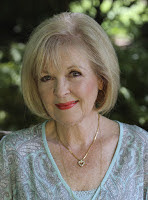 Emme Gannon is a wife, mother, and grandmother who loves to write stories that stir the heart. Her award-winning writing has appeared in Focus on the Family magazine, several anthologies, and numerous newsletters. She just completed her first novel.
Emme Gannon is a wife, mother, and grandmother who loves to write stories that stir the heart. Her award-winning writing has appeared in Focus on the Family magazine, several anthologies, and numerous newsletters. She just completed her first novel.Featured Image: Photo by Oladimeji Ajegbile on Unsplash
Published on June 17, 2022 22:00
June 16, 2022
Authors Helping Authors

by Crystal Bowman
During a recent interview for a YouTube channel, the host surprised me with a question I was not expecting, but I was happy to answer. He said, “I have noticed something about Christian authors that I don’t see in other professions. It seems that you try to help each other succeed. Why is that?”
Why Authors Help Authors
The path to publishing is varied and uncertain.Unlike most professions, there are many different paths to publishing. For most careers, there are courses to take, degrees to earn, internships to complete, and training that equips and qualifies someone for a certain career. For writers, there are courses you can take, books you can read, and conferences to attend, but there is no predetermined path to help you become an author. Taylor University is one of the few colleges to offer a professional writing degree, but most authors need to figure things out on their own—which is why we help each other. If you were to ask 50 authors how they got published, you would get 50 different answers.
It's difficult and discouraging to get a book published.Publishing a book is not for the faint of heart. Many writers face countless rejections and closed doors. Encouragement from other authors who share their experience is very helpful to those who are trying to reach their goal of being published. Authors understand how hard it is to get published which is why they celebrate with other authors when they have a new release.
It’s an unstable career financially.Most published authors cannot rely on contracts or book sales for a steady income. Many books are written by lawyers, pastors, professors, and doctors—who have jobs that provide regular income. Most authors do not make a living at writing books. That’s another reason why authors are willing to promote each other’s books with book launches and social media posts.
Mentors and mentees.No matter where you are on your writing journey, there is someone you can learn from and someone you can teach. I would not be where I am today if it weren’t for authors who mentored me and helped me get started. That’s what I love helping other writers by sharing my experiences with them.
It’s a world that is misunderstood.Many people outside of the publishing industry think that being an author means fame and fortune, and that is not the case for most authors. Authors understand the reality of the publishing world which creates a bond that others can’t relate to. Authors have to work very hard to get published and then market their books in hopes of making some sales.
Emotional ups and downs. If the author community had a motto, I think it would be Romans 12:15, “Rejoice with those who rejoice, and weep with those who weep.” Writers pour out their hearts and souls onto pages for the world to see. It can be exciting, scary, rewarding, and painful all at the same time.
Authors are like flowers.I once saw a meme with a picture of some beautiful flowers in a garden. The caption said, “Flowers don’t compete—they just bloom.” Authors are like that! Someone once asked me why I help my competition. I answered, “Writers are not my competition, they are my brothers and sisters in Christ.”
I am humbled and honored to be part of this wild and wonderful community of people we call authors who help each other succeed!
TWEETABLEAuthors helping Authors, thoughts from author Crystal Bowman on @EdieMelson (Click to Tweet)
 Crystal Bowman is an award-winning, bestselling author of more than 100 books for children and four nonfiction books for women. She also writes lyrics for children’s piano music and is a monthly contributor to Clubhouse Jr. Magazine. She loves going to schools to teach kids about poetry. She also speaks at MOPS (Mothers of Preschoolers) groups and teaches workshops at writers’ conferences. When she is not writing or speaking, she enjoys going for walks, working out at the gym, and eating ice cream. She and her husband live in Michigan and have seven huggable grandkids.
Crystal Bowman is an award-winning, bestselling author of more than 100 books for children and four nonfiction books for women. She also writes lyrics for children’s piano music and is a monthly contributor to Clubhouse Jr. Magazine. She loves going to schools to teach kids about poetry. She also speaks at MOPS (Mothers of Preschoolers) groups and teaches workshops at writers’ conferences. When she is not writing or speaking, she enjoys going for walks, working out at the gym, and eating ice cream. She and her husband live in Michigan and have seven huggable grandkids. WWW.CRYSTALBOWMAN.COMWWW.FACEBOOK.COM/CRYSTAL.BOWMANWWW.FACEBOOK.COM/CRYSTALJBOWMANWWW.INSTAGRAM.COM/CRYSTALBOWMANAUTHOR
Published on June 16, 2022 22:00
June 15, 2022
2 Simple ONLINE Habits Every Writer Needs

by Edie Melson @EdieMelson
I’ve been in the writing industry for a while (about a quarter century *gulp*). And two small habit I developed early on have been absolutely invaluable to my career. These two things have kept me from missing opportunities, provided valuable contacts, and enabled me to head off some cloning and hacking situations.
What are they?
First, I check my email spam folder every single day and second, at least once a month, I search for spam accounts that have cloned me on social media.
You should make these habits part of your regular routine and here’s why:
Two Online Checks Writers Should Do Regularly
First, Check Your Spam Folder(s) Daily
1. Publishing opportunities Hide There. Early on in my writing career I sent a proposal for my first novel to a publisher that requested it. Four weeks, six weeks and then eight weeks passed with no answer. I happened to see that editor at a writing conference and introduced myself to her and told her I was sorry my book didn’t make the cut. She looked at me surprised, “But it did. We’re just waiting for you to sign the contract.”
Yep, you guessed it. The reply—with the attached contract—was hidden in my spam folder.
2. Warnings come from there. One day I was deleting email in my spam folder and came across an odd email. It was referencing something on social media that appeared to be from me. I dug deeper and discovered I’d been tagged in some shady social media posts. By paying attention, I was able to head off potential issues.
3. Important emails can end up there. I’ve already shared about a publishing opportunity I almost missed, but other important emails can get shunted to spam. Years ago, when I was just getting The Write Conversation established with regular contributors, an email showed up in my spam folder. The sender claimed to be writing on behalf of the Warren Adler, one of our great American Novelists. I almost deleted it, because after all, why would Warren Adler want his assistant to contact me? But the email didn’t read like your usual spam email. The grammar and syntax were excellent and the email address matched the person who’d written the email.
I moved the email into my inbox and answered. Turns out it WAS from Warren Adler’s assistant and he (Warren Adler) was looking for places to share information with writers and had chosen The Write Conversation. I was beyond shocked and humbled!!!! That great man wrote regularly for The Write Conversation for several years before his death.
4. Notifications you need hide there. We just finished up the Blue Ridge Mountains Christian Writers Conference and one of the services we provide to attendees is the opportunity to purchase the recordings of the classes and keynotes (and no, we are unable to sell those to anyone who isn’t present at the event). The one thing we emphasize strongly to each purchaser is the need to check their spam folder. The notification that the recordings are ready for download will come through email. And we really have no control over whether or not it ends up in someone’s spam folder. You’d be amazed at what important notifications can be found there.
Second, Why to Search for Yourself on Social Media Regularly
Before I give you my reasons, I want to make sure we’re on the same page with terminology. Today I want to share two irritating things that can happen online: Hacking and Cloning. They are NOT the same thing.
Hacking: If you’ve been hacked, someone has stolen access to one of your accounts and is using that account to share posts and/or email. This can be a huge headache and will require you to contact the account provider to unravel the mess and either return access of that account to you or get it closed down.
Cloning: If you’ve been cloned, someone has stolen your public information and used it to open a new account pretending to be you. They have not stolen your password or taken anything private. While it is irritating, this is much more common and much easier to clean up—IF you discover it in a timely manner.
Tips & Reasons for Doing a Social Media Search for Yourself
First, before this even becomes an issue, I strongly urge you to put into place a two-step verification for every single social media network you’re part of. Yes, it makes it harder to log in on different devices, but that momentary inconvenience is NOTHING compared to being hacked.
1. I search for myself at least every two weeks on every social media network. But a monthly search is adequate for most people. And yes, I have a calendar reminder to search for social media accounts—it's THAT important. Here’s what I do:I go to each social media network where I have an account and I type my name into the search. I don’t just look at the thumbnails that appear, I go ahead and click to do a deeper search. I’m looking for odd spellings of my name (sometimes with added characters or numbers). I’m also looking for pictures of myself—especially profile pictures that are current or have been used in the past. I set aside an hour for this and I go through each social media account separately.
2. I don’t give hacked or cloned accounts to develop a footprint. The reason I check for these accounts so often is because if I don’t, then the impersonators have a chance to gain a following and look legitimate. This makes it harder to prove that I was the one who owned the account first. I’ve seen quite a few people who let too much time go by and lost the right to their own name on different networks. Be proactive NOW and avoid heart ache later!
3. If I find a cloned account, I immediately report that account. Facebook, Twitter, Instagram, and all the others have a place where you can report an account. I do NOT block these cloned accounts because I want to be able to check and make sure they’re closed down.
4. I notify my followers after I’ve reported the account. Once I’ve reported the account, I put up a post on that social media network letting my friends and followers know there’s an impersonator out there. I also ask them to go to that account and report it. This helps legitimize my claim to the social media network’s powers-that-be.
Final Note: Before the possibility of hacking or cloning even becomes an issue, I strongly urge you to put into place a two-step verification for every single social media network you’re part of. Yes, it makes it harder to log in on different devices, but that momentary inconvenience is NOTHING compared to being hacked.
Bottom LineWe live in a time where it’s important for writers to be active online. But with this comes the responsibility to govern those accounts and watch for people who will misuse them. Ignorance is not an excuse. These two habits aren’t difficult. And by adding them to your regular routine, you will save yourself hours of headaches & heartaches later.
Now it’s your turn, what have you discovered by checking your spam folder and social media regularly? And if you don’t have these two habits in place, why not? Share your thoughts in the comments section below.
Don’t forget to join the conversation!Blessings,Edie
TWEETABLE2 Simple ONLINE Habits Every Writer Needs to Practice, tips from @EdieMelson (Click to Tweet)
 Edie Melson is a woman of faith with ink-stained fingers observing life through the lens of her camera. No matter whether she’s talking to writers, entrepreneurs, or readers, her first advice is always “Find your voice, live your story.” As an author, blogger, and speaker she’s encouraged and challenged audiences across the country and around the world. Her numerous books reflect her passion to help others develop the strength of their God-given gifts and apply them to their lives. Connect with her on her website, through Facebook, Twitter, and Instagram.
Edie Melson is a woman of faith with ink-stained fingers observing life through the lens of her camera. No matter whether she’s talking to writers, entrepreneurs, or readers, her first advice is always “Find your voice, live your story.” As an author, blogger, and speaker she’s encouraged and challenged audiences across the country and around the world. Her numerous books reflect her passion to help others develop the strength of their God-given gifts and apply them to their lives. Connect with her on her website, through Facebook, Twitter, and Instagram.Here's a Fun Picture to share on Pinterest!
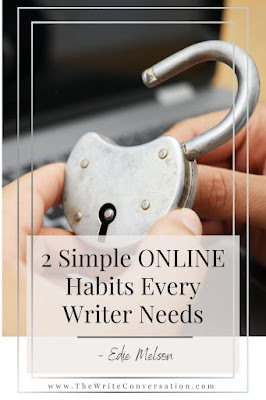
Published on June 15, 2022 22:00



